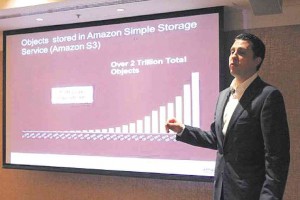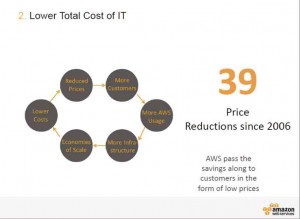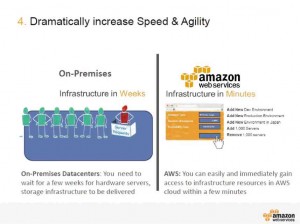Businesses, big and small, warm up to cloud
Keeping up with technological advancements to run or even start a business does not have to be as costly, time-consuming and as labor-intensive as before. Thanks to cloud computing, big companies acquire the agility of smaller ones in making decisions and implementing them, while smaller firms and startups with limited capital gain access to the latest technology—something they need to catch up with competition and the fast-changing demands of the market at affordable costs.
While companies and markets in developed countries were quick to adapt to the latest cloud developments, questions on the readiness of Philippine businesses and the Filipino consumers to cloud migration remain. The country’s IT/telecommunications infrastructure and connectivity is still a major concern. Many businesses—particularly family-owned—continue to favor the traditional ways of doing things. Also, most Filipino consumers are hesitant to transact online.
Rick Harshman, head of Amazon Web Services in the Asean (Association of Southeast Asian Nations) region, believes the country is mature enough to take the leap to the cloud.
The infrastructure concern, he says, is being addressed by the providers who recognize the trend, based on the adoption of smart phones and tablets in the Philippines, and are continually investing to meet present and future demand.
“Ten years ago, connectivity was indeed a struggle .But in the last eight years or so that I have been going to the Philippines, connectivity has improved by leaps and bounds, and I expect that to continue,” says Harshman in an interview.
Another reason for the hesitance of both businesses and consumers to move to the cloud is security. This, according to Harshman, should not be a concern for security is the top priority of AWS, which uses the same security measures as those used by large enterprises, and is continuously investing in these measures.
Adoption
The rate of cloud adoption in the Philippines and the rest of the Asean (Association of Southeast Asian Nations) has been phenomenal, Harshman says.
“What’s great about the Philippines is that you have a phenomenal developer community that allows excellent software development, even gaming development. There’s a huge BPO (business process outsourcing) industry that uses the cloud platform,” he adds.
Harshman was in the Philippines recently to launch the Manila location of AWS’s Edge, a web caching service that allows businesses to distribute content at high speed.
The last four years or so, Harshman said, saw the development of a strong and vibrant start-up ecosystem in the country. To AWS, this presents great opportunities for the adoption of cloud computing and its products and services in the Philippines.
“But it is not only the startup ecosystem that makes the prospects here great. There are well-established local companies with regional and global aspirations that leverage our platform to pursue their expansion plans, and Jollibee Food Corp. is a great example. The company has been using our platform for more than three years now. Working with companies like Jollibee gives us an indication that there are a lot of opportunities for us in the Philippines,” Harshman says.
“Quite frankly, putting up an office in the Philippine is something we are looking at because of the level of interest and demand here.”
Expansion
AWS, an Amazon.com company that provides remote computing services, was put up in 2006. It is now servicing hundreds of thousands of customers in more than 190 countries. It caters to startups, small, medium and large enterprises, educational institutions and government agencies.
With its strong growth potential, the Asean has become one of the targets of AWS’ expansion efforts. An office dedicated to the Asean was formed about four years ago, bringing closer to
the region AWS’ global infrastructure that can run practically everything in the cloud—enterprise applications, e-government projects, big data analytics, and social and gaming apps for web and mobile.
AWS offers more than 40 products and services falling under the following categories: data base, storage and content delivery, compute, networking, deployment and management and apps services.
Under data base are Relational Database Service or RDS, a web service that makes it easy to set up, operate and scale a relational database in the cloud; DynamoDB, a predictable and scalable data store; Elasticache for easy deployment, operation and scaling of in-memory cache in the cloud, and Redshift, a fully managed, data warehouse service.
For storage, AWS offers Simple Storage Service or S3 for the Internet, designed to make web-scale computing easier for developers; Glacier, a low-cost storage service that provides secure and durable storage for data archiving and backup; Elastic Block Storage or EBS which provides block storage volumes; Storage Gateway, a service connecting an on-premises software appliance with cloud-based storage to provide seamless and secure integration between on-premises IT environment and AWS’ storage infrastructure; and Import/Export, which accelerates movement of large amounts of data into and out of AWS.
For content delivery, the company offers CloudFront, a web service that integrates with other Amazon web services to give businesses an easy way to distribute content to end users.
Under deployment and management are Identity and Access Management, which can be used to securely control access to AWS services and resources; CloudWatch, a monitoring system for cloud resources and the applications that customers run on AWS; Elastic Beanstalk for the quick deployment and management of applications in the cloud; CloudFormation, which gives developers and systems administrators an easy way to create and manage a collection of related AWS resources, provisioning and updating them in predictable fashion; Data Pipeline, a service that helps users to process and move data between different AWS compute and storage services, as well as on-premise data sources, and OpsWorks, a solution for managing applications of any scale or complexity on AWS cloud.
Compute products and services include Elastic Compute Cloud or EC2, which provides resizable computing capacity in the cloud; Elastic MapReduce or EMR, which enables users to easily and cost-effectively process vast amounts of data; Auto Scaling, a tool that allows users to scale their EC2 capacity up or down automatically, and Elastic Load Balancing, which distributes incoming application traffic across multiple EC2 instances.
For networking, AWS offers Virtual Private Cloud, which gives users private, isolated section of the AWS; Route 53, a scalable domain name system web service, and Direct Connect, which allows the establishment of a dedicated network connection from on-premise infrastructure to AWS.
AWS also offers the following application services: Simple Queue Service that assures reliable, highly scalable, hosted queue for storing messages as they travel between computers; Simple Notification Service, a system that makes it easy to set up, operate and send notifications from the cloud; Simple Workflow Service, a system for building scalable, resilient applications; Simple E-mail Service, a highly scalable and cost-effective bulk and transactional e-mail sending service; CloudSearch, a fully managed search service in the cloud; and Elastic Transcoder, a system that allows developers and business to convert video files from their source format into versions that will play back on smartphones, tablets and PCs.
Startups
Seeing the opportunities arising from the expanding startup ecosystem, AWS recently introduced AWS Activate, a structured package of resources that allow startups to gain access to technology resources that enable them to quickly and easily get started and scale up as their business grows.
AWS Activate comes in two packages—a self-starter package and portfolio package.
The first package includes access to the AWS free usage tier, which provides new AWS customers up to one year of free access to a variety of AWS services, enabling developers to launch new applications, broaden their AWS knowledge or simply gain hands-on familiarity with the services at no cost; one month developer-level AWs support, a one-on-one, fast-response support channel that is staffed 24/7 with experienced technical support engineers providing services such as client side diagnostic tools, best practice guidance and email support with 12-hour response time from an AWS cloud support associate; web-based training and a self-paced lab, which are hands-on tutorials designed to help customers acquire new skills and gain practical experience with AWs technologies; and AWS startup forum, which offers the opportunity to tap into the vast body of knowledge in the AWS startup community.
The portfolio package offers eligible startups AWS credits that can be redeemed against fees for services, such as Amazon EC2, Amazon S3, RDS, CloudFront, Dynamo DB, Amazon EMR, Redshift and Glacier; business-level AWS support for up to one year including all of the benefits of developer-level AWS support plus AWS trusted adviser and access to phone, chat, email and screen sharing support with one hour response time from an AWS cluod support engineer; Web-based and instructor-led training; startup forum privileges; and access to offers on products from select third-party companies.
In the Philippines, Amazon Activate is now being used by several startup companies including some of those under Globe Telecom’s technology incubation program.
Benefits
With its products and services, AWS aims to free enterprises from “undifferentiated heavy lifting” as it takes care of maintaining data centers, servers, storage, networking, cabling and labor for them. This allows enterprises to focus their time, manpower and resources on running the business as they no longer have to buy and install new hardware and build and maintain on-premise data centers.
AWS cloud also allows enterprises to save on costs as the AWS platform requires clients to pay only for infrastructure as they need it, with no upfront cost required. It offers unlimited capacity. It dramatically increases speed and agility as enterprises can easily and immediately gain access to infrastructure resources in AWS cloud within a few minutes instead of weeks to put up hardware servers or storage infrastructure in on-premise data centers. It also allows clients to reach their markets—local and global—in minutes.
The list of AWS cloud products and services, not to mention the applications that use them, can be overwhelming, particularly for those who have yet to try the cloud.
But Harshman says migrating to the cloud need not be done in one big move. While those that are just starting can do so, enterprises with legacy applications and well-established on-premise facilities are advised to do so methodically, starting with a few applications that will enable them to learn how to run in the cloud. Building a migration plan is necessary, according to AWS.

















